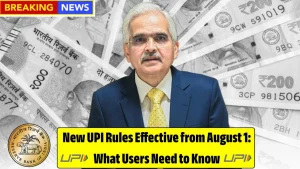New Delhi – The New UPI Rules officially take effect on August 1, 2025, marking a significant transformation in India’s digital payment landscape. Implemented by the National Payments Corporation of India (NPCI), these comprehensive regulations will fundamentally alter how users interact with popular payment platforms including Google Pay, PhonePe, and Paytm.
The New UPI Rules represent a strategic initiative to enhance payment system efficiency while strengthening fraud protection mechanisms. These regulations address critical operational challenges that have emerged as UPI transactions continue their exponential growth across the country.
According to the NPCI circular issued on May 21, 2025, the New UPI Rules are specifically designed to improve application performance during peak usage periods while providing enhanced security features for millions of daily users.
Balance Enquiry Limitations and Enhanced Visibility

One of the most significant aspects of the New UPI Rules involves strict limitations on balance enquiry functions. Users will now be restricted to checking their bank balance only 50 times per day through any UPI application, representing a substantial change from previous unlimited access.
The New UPI Rules also empower payment service providers to further limit or completely halt balance enquiry requests during peak operational hours. This measure aims to reduce system load when transaction volumes are highest, ensuring smoother overall performance for all users.
A positive enhancement within the New UPI Rules framework allows users to view their available account balance with every transaction. This real-time balance visibility eliminates the need for separate balance checks and provides immediate financial awareness during payment processes.
Autopayment Processing Time Restrictions
The New UPI Rules introduce significant modifications to autopayment processing schedules. These automated transactions, which allow banks to debit predetermined amounts on recurring basis, will now only process during designated non-peak hours.
Under the New UPI Rules framework, autopayments can only be processed before 10 AM, between 1-5 PM, and after 9:30 PM. This scheduling restriction addresses the strain that automated transactions place on Application Programming Interface systems during high-traffic periods.
The New UPI Rules specify that autopayments scheduled during restricted hours may be debited either before or after the originally scheduled time. For instance, an autopayment due at 11 AM might be processed earlier in the morning or later in the evening, depending on system capacity.
Additionally, the New UPI Rules provide retry mechanisms for successful autopayment deduction. If initial attempts fail, the system will make additional attempts before ultimately canceling the autopayment, ensuring reliability while maintaining system efficiency.
Bank Details Access Modifications


The New UPI Rules establish new protocols for accessing bank account information linked to mobile numbers. Users can now view their connected bank list, but this access is limited to 25 times per day, creating a controlled environment for sensitive financial information access.
Under the New UPI Rules framework, bank details can only be accessed at specific times, and requests must be customer-initiated after selecting the issuer’s bank within the UPI application. This structured approach enhances security while maintaining necessary accessibility for legitimate users.
Enhanced Transaction Status Updates
The New UPI Rules address one of the most frustrating aspects of digital payments: unclear transaction status during peak hours. Previously, users often experienced situations where money was debited from sender accounts but not received by recipients, creating confusion and concern.
The New UPI Rules implement faster status update mechanisms, ensuring that unconfirmed payments receive status updates within seconds rather than remaining in pending status for extended periods. This improvement significantly enhances user experience and reduces payment-related anxiety.
Furthermore, the New UPI Rules limit payment status checks to three attempts per transaction, with mandatory 90-second intervals between status inquiries. This limitation prevents system overload while providing adequate opportunities for users to verify transaction completion.
Recipient Verification and Fraud Prevention
A crucial fraud prevention feature within the New UPI Rules requires displaying recipient names before transaction completion. This verification step helps users confirm they are sending money to intended recipients, reducing errors and fraudulent transfers.
The New UPI Rules mandate that registered recipient names appear alongside transaction IDs within UPI applications. This transparency measure provides users with clear confirmation of payment destinations before authorizing transfers.
Compliance and Enforcement Mechanisms


The New UPI Rules include strict compliance requirements for all payment service providers. NPCI reserves the right to implement various enforcement measures for non-compliance, including API restrictions, financial penalties, and suspension of new customer onboarding capabilities.
These enforcement provisions within the New UPI Rules ensure that all payment platforms maintain consistent standards and user protection measures. The comprehensive enforcement framework demonstrates NPCI’s commitment to maintaining system integrity and user safety.
Impact on Major Payment Platforms
The New UPI Rules will uniformly affect all major payment platforms, including Google Pay, PhonePe, and Paytm. Each platform must implement these regulations simultaneously, ensuring consistent user experience across different applications.
Future Implications and User Benefits
The implementation of New UPI Rules represents a significant step toward creating a more efficient, secure, and user-friendly digital payment ecosystem. These regulations balance system performance optimization with enhanced fraud protection, ultimately benefiting millions of daily UPI users.
The New Rules demonstrate NPCI’s proactive approach to addressing emerging challenges in India’s rapidly evolving digital payment landscape while maintaining the convenience and accessibility that have made UPI the world’s leading real-time payment system.

